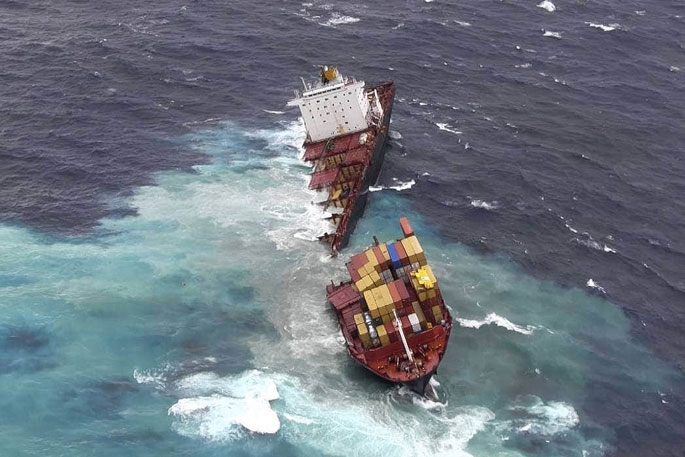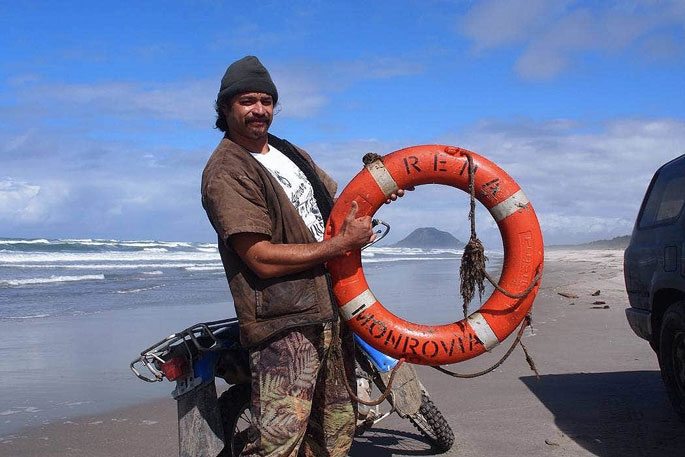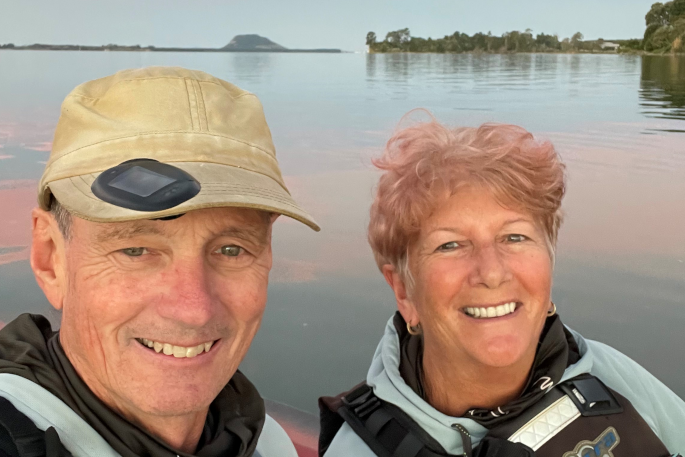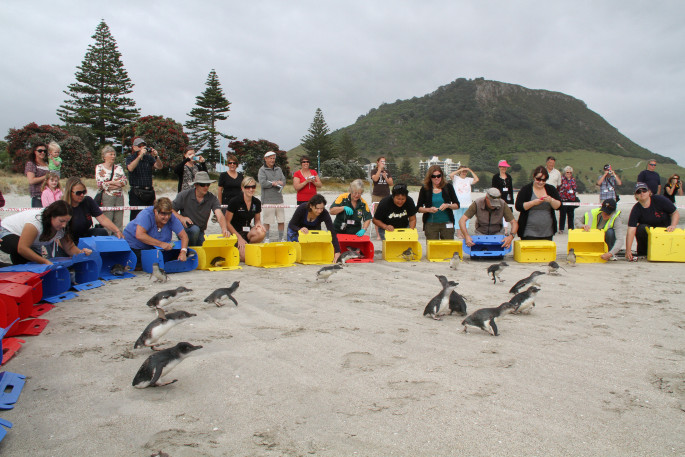The locally-produced film ‘Taking Back our Beach’ which opened on October 5, has been extended into a third week of screening at United Cinemas Bayfair.
The film, which takes the audience through the local Bay of Plenty community’s response to the coastal disaster after the grounding of the MV Rena in October 2011, has had up to five screenings a day at the cinema.
It’s also been screened at Rialto Tauranga and Rialto Papamoa, amongst 25 cinemas across New Zealand during October and November.
After around 400 people attending the opening night, more than 2000 people went to see the film during the first week, with groups also using booking whole cinemas for charity fundraisers.
PIPS – Parents & Plants in Schools ran a fundraiser for their 2024 programme. Volunteering BOP with Envirohub ran a fundraiser night for Western Bay Wildlife and ARRC, and Rotary Club of Tauranga Sunrise raised over $800 for Western Bay Wildlife Trust through their screening event.
With whole cinemas booked for the fundraisers at United Cinemas Bayfair, speakers were able to be included for question and answer times following the screenings. Past-mayor Stuart Crosby, Western Bay Wildlife’s Paul Cuming and Julia Sorenson, Bay Conservation Alliance chair Julian Fitter, Captain Kevin Judkin and Jack Thatcher all participated in one or more Q&A sessions along with the filmmakers Anton Steel and Rosalie Liddle Crawford.
Mount Maunganui Intermediate also booked out whole cinemas for their 700 students to see the film during the first week of the school term.
Groups from Tauranga Bird Club, Te Puke Baptist, Gwen Rogers Kindergarten, Pongakawa School and Tauranga Waldorf School also booked group sessions.
“There were over 8000 people who signed up to help with the beach clean-up back in 2011, and we’d love every one of them to be able to come and see ‘Taking Back our Beach’,” says Rosalie.
“It’s fantastic that people are coming to see it in large groups together, as the film will probably bring back or trigger many memories, some of which may have been pushed down over the last decade. To be able to share those feelings and memories with others who they’re also seeing the film with could actually be really helpful for processing and dealing with a sense of closure that people may not have previously had.”
Feedback from the film’s screenings has come from all age groups.
A nine-year-old who saw it during the first week with his family at the Envirohub/Volunteering Services night, says he is looking forward to seeing it again with his school group.
“My family and I went and saw ‘Taking Back our Beach’ on Monday. I had tears a couple of times. My 6 and 8 year olds were enthralled through the whole thing which is no small praise,” says ACT List MP Cameron Luxton.
“Saw it today at Rialto. Well done!! What a journey that was. Going back to see it again,” says Paula Whetu McLeod.
Julia Sorenson who was working in Hawke’s Bay when Cyclone Gabrielle struck, and who helped lead the rescue of little blue penguins following the 2011 Rena grounding, travelled up to Mount Maunganui from Hawke’s Bay for the film premiere on October 5.
“The 12th anniversary of the Rena oil spill was spent on the red carpet with fellow Western Bay Wildlife Trustees at the Rena documentary #takingbackourbeach premier. I highly encourage all New Zealanders to see this. In a way, Cyclone Gabrielle mirrors the Rena - a catastrophic event that brought an entire community together to battle the odds and bureaucracy. Lessons can and should be learned from these events,” says Julia.
“WOW! Go see Taking Back Our Beach when it comes to a theatre near you," says Linda Thompson who was the communications manager at the Rena Incident Command Centre in 2011.
"Went to the premiere tonight with others who were involved in the making of it and was blown away. If you were there at the time 12 years ago bring tissues. That wreck swallowed years of my life (and I make several appearances). It's utterly professional and moving. Well done."
“[The] premier of Taking Back Our Beach film was outstanding,” says Film Bay of Plenty’s Elysia Gibb. “Hearing peoples stories of our biggest environmental disaster and seeing how the experience was navigated really showcased the power of community.
“The Rena didn’t end at the sinking, it created new community groups that now protect and nurture our environment. Well done to Anton Steel and Rosalie Liddle Crawford for telling such a powerful story and to everybody who contributed to that story. Make sure you take time to see it and learn about one of the Bay of Plenty NZ significant stories.”
 The MV Rena which grounded on Astrolabe Reef in 2011, resulting in New Zealand's largest environmental disaster. Photo: Supplied.
The MV Rena which grounded on Astrolabe Reef in 2011, resulting in New Zealand's largest environmental disaster. Photo: Supplied.
“It truly is a “must see”!!" says Tauranga Bird Club president Sheryl Baron. "It is the story of the Rena grounding and the impact upon and response by a New Zealand community. It truly is a remarkable story told through the voices of those who were there in October 2011."
“Just saw an amazing kiwi movie about the Rena grounding. Brilliant insight into the impact on the Tauranga community, the bureaucracy and the mobilisation of grassroots community and grace of our tangata whenua,” says Mike Seabourne.
“An incredibly moving film made by some amazing people, reflecting on an unprecedented national environmental disaster, and capturing the response of a strong community. Make sure you go see it on the big screen... beautiful,” says Kristy Robinson.
 Sam Taikato on Matakana Island, with a life ring from the Rena. Photo: Brian Rogers.
Sam Taikato on Matakana Island, with a life ring from the Rena. Photo: Brian Rogers.
Before the film even launched, a second week of bookings was opened at United Cinemas Bayfair, with sessions expanding to five a day. 'Taking Back Our Beach' is now part way through its third week at United, and the public is encouraged to go see this film that showcases their community.
The stories of the clean-up couldn't be possible without the thousands of people from all walks of life who came together to save their beloved beaches, says Anton.
“It's this positive message of the power of the community uniting in the face of disaster that viewers are left with.”
Funded and supported by Sun Media, HOBEC, BOPRC, Priority One, Western Bay Wildlife, Bay Conservation Alliance, Vision Media, Film Bay of Plenty and hundreds of individuals and crowd-funders, the film captures the shock, anger and grief driven into the heart of the local community, as a groundswell of volunteers went out daily to help save wildlife and clean up the massive field of oil and debris strewn along the coast.
The BOP premiere on October 5 was an emotional experience for those who knew Bruce Fraser, Sue Behrens and Brian Rogers, who have all died while the film was being made. Brian died of bowel cancer last year, but was able to see the movie's final cut with his father Mick and Claire, who is the film’s executive producer. His memories of the fateful morning are poignantly documented in his final interview, describing the moment he realised it was going to be a major environmental crisis.
Brian and Claire Rogers, co-founders and owners of Sun Media, made headlines on SunLive with the news that the cargo vessel MV Rena had struck Ōtāiti - Astrolabe Reef approximately 12 nautical miles off the coast of Tauranga.
 Sun Media co-founders Brian and Claire Rogers. Photo: File/SunLive.
Sun Media co-founders Brian and Claire Rogers. Photo: File/SunLive.
A member of the local Coastguard, Brian was the first journalist on the scene of what would become NZ’s biggest environmental disaster. He broke the news to the world.
The title of the film ‘Taking Back Our Beach’ came from a bold statement that Sue made during the clean-up.
“It’s our beach. We’re taking ownership,” says Sue, her words now forever preserved.
For screening times across New Zealand go to www.takingbackourbeach.com. The film runs for 90 minutes.



0 comments
Leave a Comment
You must be logged in to make a comment.